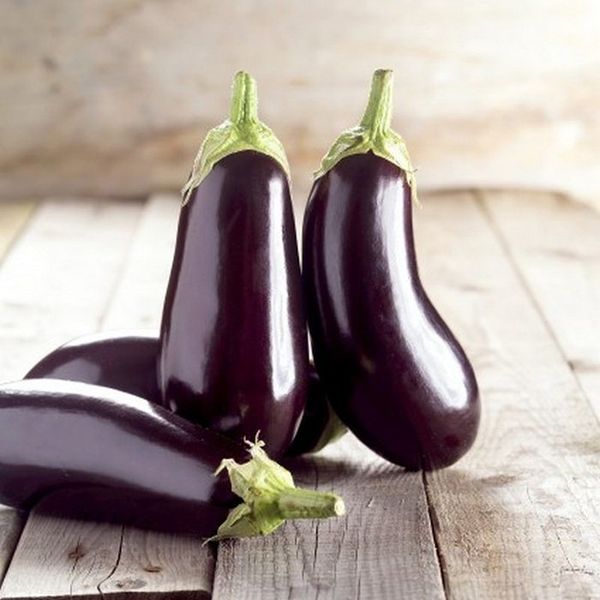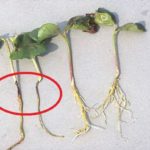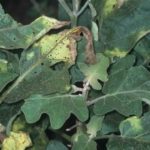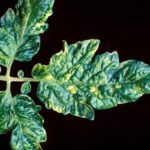Eggplant is a very tasty and healthy vegetable grown in all parts of our country. In the central and northern region of the vegetable is grown exclusively under the film. Every gardener wants to grow a rich harvest of this wonderful vegetable and for this choose seeds that produce large and large fruits. The description of the characteristics of eggplant Diamond will help you make sure that this is the right choice.
Table of contents
Description and characteristics of the variety Almaz
- The variety is mid-season. From germination to harvest - 100 - 130 days.
- The bush grows compact, up to 60 cm high. The leaf has a green color with purple streaks
- Bearing cup, deep green with purple tint
- Fruits of medium weight (up to 160 grams) and medium length (up to 20 cm). Formed at the bottom of the stem, at 30 cm from the ground
- In technical maturity, the fruit is dark purple, the flesh is green with a small amount of seeds
- The variety has immunity to solanaceous diseases
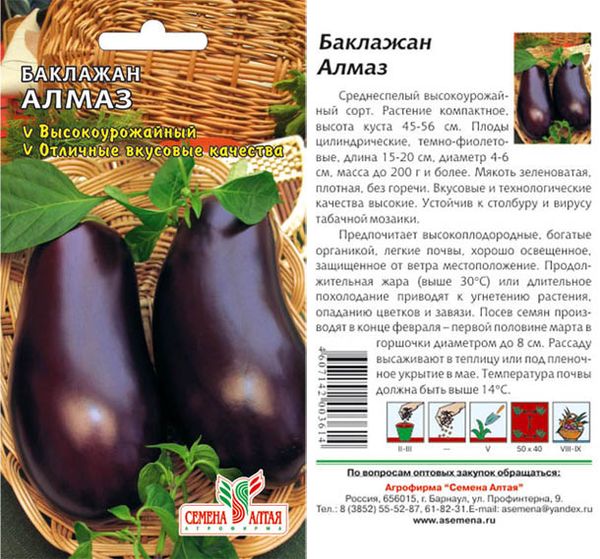
Advantages and disadvantages
The advantages include:
- Grade high-yielding, with 1 square. meters can collect up to 8 kg of fruit
- Resistance to fungal and viral diseases
- Bush compact, less branched
- Excellent transportability and storage time
- Diamond is widely used in cooking.
No apparent flaws identified.
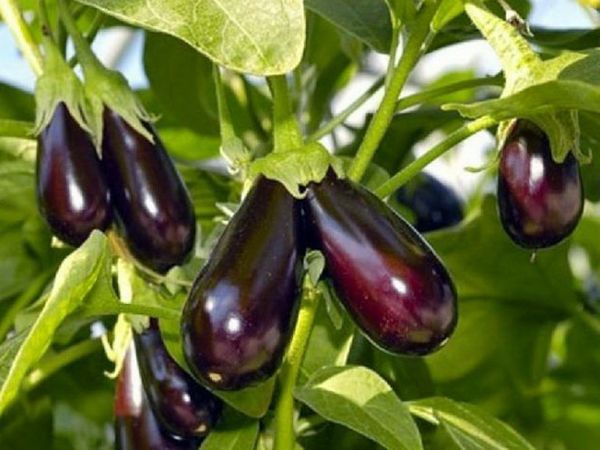
Seed preparation for planting
The seeds of the variety are medium. Before planting it is necessary to carry out pre-sowing treatment:
- Seed selection
- Calibration
- Disinfection
- Stimulation of growth
Seed selection
- You need to buy zoned seeds
- It is better to purchase hybrids
- Check expiration date
- It is better to buy: coated, granulated, inlaid seeds. Since they do not need disinfection and have good germination.
Calibration
This process consists in sorting seeds by density suitability. The seeds are immersed in a saline solution (5 grams of salt per 100.0 of water) and all the surfaced, empty, are removed. Weighing seeds, flush salt from running water.
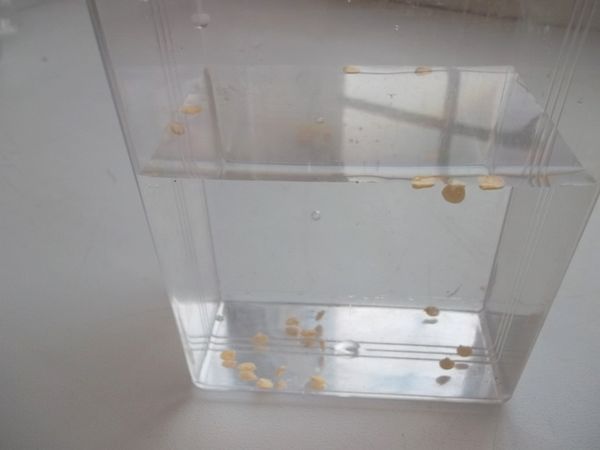
Disinfection
All seeds not processed by the manufacturer need to be processed.
1% solution of potassium permanganate:
- It should be a rich color, but not dark purple.
- You can not perederzhivat seeds in solution, the optimal time for complete disinfection - 15 - 20 minutes
Stimulation
If the seeds are not germinated before planting, growth promoters can be used. These drugs accumulate nutrients for good germination.
As stimulants, you can use: Kornevin, Zircon, Heteroauxin and Epin.
Preparing the soil for planting eggplant
Since the cultivation of eggplant is carried out by seedlings, it is necessary to pre-prepare the soil for planting seeds.
Loose and nutritious soil, a guarantee of rapid germination of seeds. You can buy it in flower shops or make it yourself. To do this, mix the humus, sawdust and peat. Before adding sawdust, they must be scalded twice with boiling water to remove tar.
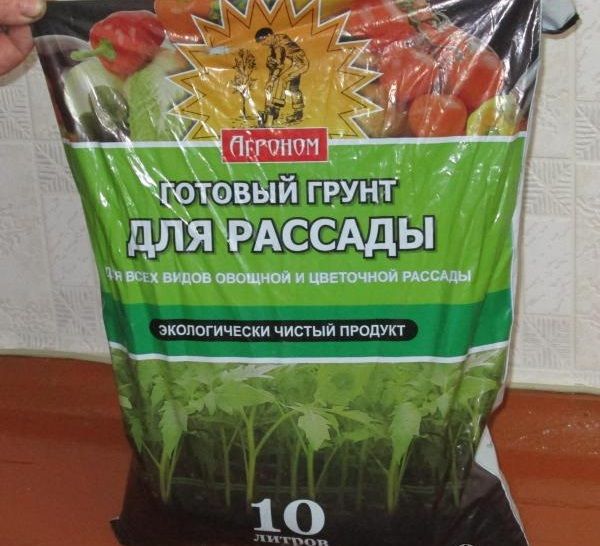
Also, land can be taken directly from the garden.
Landing technology
How to plant eggplants variety Diamond?
- Seeds are planted at a depth of 2 - 3 cm, in the wet ground
- Planted seed, covered with film and retracted in a warm, bright place.
- After 2 weeks, the first shoots will appear, only if a comfortable temperature was created for the seeds (24-26 degrees)
- Seedlings are watered with warm water using a spray bottle.
- After 14 days spend the first feeding of young shoots
For good germination, high temperature and moderate humidity are necessary.
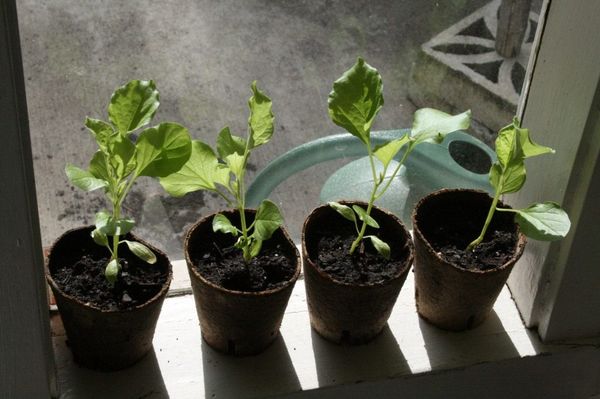
- After the emergence of seedlings, the film is removed and the seedlings are hardened. For this it is necessary to gradually lower the air temperature to 18 - 20 degrees. Hardening is carried out for quick adaptation of the plant, when transplanting to a permanent place.
Planting Eggplant Diamond
- Seedlings are planted at the age of 50 -70 days.
- If Diamond Eggplant will grow in the open field, the place must be prepared in a sunny, draft-free place.
- The distance between the rows - 60 cm, and between plants - 40 cm.
Departure after landing
Care is reduced to:
- Watering
- Feeding
- Loosening
Loosening gives access to air to the roots, and timely removal of weeds protects the plant from various diseases, since weeds are a good carrier of fungi and viruses. Loosening, conducting superficially, so as not to damage the root system.
Plant feeding is carried out in three stages:
- The first top dressing with urea is made at the age of 18 - 20 days from the transplant to a permanent place.
- The second with the use of superphosphate and urea - a month after the first.
- Third, during the formation of the fruit. You can use mullein.
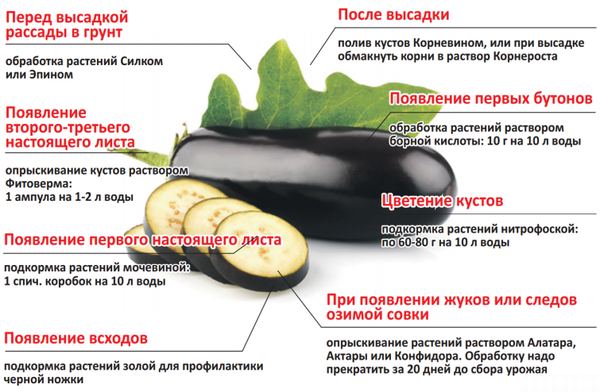
If Diamond eggplant poorly forms the ovary and fruit, the plant must be fertilized with potash fertilizers.
To do this, the plant is sprayed with a sweet solution prepared: 100 grams of sugar, 2 grams of boric acid diluted in a liter of hot water.
Disease and Prevention
Although the variety is resistant to various diseases, with improper care it can be affected:
- Late blight. The disease is manifested by the appearance of white spots on the leaves. With no assistance, the fruits rot, and the aerial part dies.
- Cruciform flea. Black dots are massively formed on the plant, which destroy young seedlings with great speed.
- Blackleg. It occurs when soil moisture is high. The root collar turns dark and the bush begins to wither quickly.
- Mosaic. A peculiar, intricate pattern is formed on the leaves and fruits. As a result, the bush fades and perishes.
Prevention is:
- In crop rotation
- Seed preparation
- Planting seedlings to cotyledon leaves
- Timely removal of infected plants
- Watering is carried out only with warm water.
- Black leg eggplant seedlings
- Late blight on eggplant leaf
- Tobacco mosaic
- Cruciferous flea closeup
Harvesting and storage rules
Eggplant ripens on day 30 after the formation of the fruit. Eggplant, a multi-ripening crop and therefore harvesting is carried out every 7 days as the fruit ripens. Fruits are cut with a sharp shears along with the stem. Since Diamond has a non-piercing calyx, this procedure can be carried out boldly, without fear of cutting with sharp spikes.
Before storage, the fruit must be carefully sorted, removing all damaged and diseased fruit. A healthy vegetable has an elastic, clean, no visible damage to the surface.
Selected fruits are placed on the stalk of straw down, covered with a bag and left for 11 days. Then conduct a secondary selection. Fruits that have passed the test of time, wrapped in paper and clean in a cool place.
Carrying out all the recommendations for the care of Diamond Eggplant, wasted effort and time will not be in vain. Shrub will thank delicious, large fruits that can be used in the preparation of culinary masterpieces.
